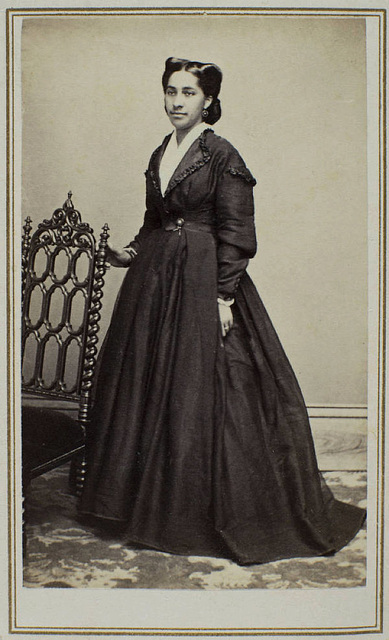Katherine 'Kittie' Knox
Elizabeth “Lizzie” Austin Taylor
Althea Gibson
Mabel Fairbanks
Mamie Cunningham
Daniel Freeman: DC's 1st Black Photographer
Robert Blair
Wells and Wells
Madame Marie Selika
Louisa Melvin Delos Mars
Belle Davis
The Cake Walkers
Madam Desseria Plato
The Black Swan: Elizabeth Taylor Greenfield
Annie Pauline Pindell
Daisy Tapley
Siren Navarro
Sharp as a Tack
John Roland Redd: Hiding in Plain Sight
First Talkie Featuring All Black Cast
Nina Mae McKinney
Ruby Elzy
Juanita Moore
Leah Pitts
Kitty Dotson House Pollard
Harriet Russell
Mary Church Terrell
Miss Pope: The Rosa Parks of DC
Lucille Bishop Smith
Pete and Repeat
Mary Sampson Patterson Leary Langston
Officer Bertha Whedbee
Bettiola Heloise Fortson
Elizabeth B. Slaughter
Mrs. Molyneaux Hewlett Douglass
Elizabeth A. Gloucester: The Wealthiest Black Woma…
Their Gold Was Not Tarnished: Loved Ones of the F…
1st Black Female Aviatrix: Bessie Coleman
Marie A. D. Madre Marshall
Forgotten No More: Annie Malone
Annie Mae Hunt
Addie Rysinger
Julia P Hughes
Martha Bailey Briggs
Alethia Browning Tanner
Authorizations, license
-
Visible by: Everyone -
All rights reserved
-
8 visits
Louise DeMortie


She has been slighted by historians although she was one of the most important African Americans of her time. "De Mortie's life stands as one of the foundations in which advancements of African Americans was built. Giving up her prosperous and happy life in Boston, she undertook the selfless and difficult task of caring for homeless and indigent children in a southern city that was foreign to her."
Louise De Mortie, born in Norfolk, Virginia in 1833, was well known as a lecturer, reader and persuasive public speaker who first made her mark in the exclusive social circles of Boston, Massachusetts. She was born into a high achieving family of free people of color. She moved to Boston in 1853 as did her future husband, John Oliver (1821 - 1899) a free black carpenter and an abolitionist from Petersburg, Virginia. They divorced sometime in 1862. Sources do not indicate that De Mortie ever remarried and there is no mention of surviving children.
From 1865 until her death, De Mortie continued her work as a fundraiser for the orphanage, traveling to Boston, Philadelphia and other northern cities where she was well known to raise funds for the institution. It was necessary for her to do this because of the difficulties the orphanage experienced at the end of the Civil War and after the assassination of President Lincoln. Andrew Johnson (Lincoln's vice president) did not support the previous administration's humanitarian stance. At the time of the new administration's defunding, it was proposed that the orphans were to be apprenticed to various employers (likely plantation owners) until the age of 15 for females and 18 for males. This would reinstate de facto enslavement for the orphaned children ... akin to reversing emancipation for black children who lacked parental support. With this huge upheaval the orphans narrowly escaped being apprenticed by the government to their former owners, by being moved to Marine Hospital, still under the protection of the Freedman’s Bureau, while funds continued to be raised.
She died on October 10, 1867, in New Orleans during a yellow fever epidemic.
Sources: National Anti-Slavery Standard, October 26, 1867; Notable Black American Women, Book 2 by Jessie Carney Smith; Sacred Ground by A. Craig Fisher, Ph.D.; Eugene A. Piffet, photographer
Louise De Mortie, born in Norfolk, Virginia in 1833, was well known as a lecturer, reader and persuasive public speaker who first made her mark in the exclusive social circles of Boston, Massachusetts. She was born into a high achieving family of free people of color. She moved to Boston in 1853 as did her future husband, John Oliver (1821 - 1899) a free black carpenter and an abolitionist from Petersburg, Virginia. They divorced sometime in 1862. Sources do not indicate that De Mortie ever remarried and there is no mention of surviving children.
From 1865 until her death, De Mortie continued her work as a fundraiser for the orphanage, traveling to Boston, Philadelphia and other northern cities where she was well known to raise funds for the institution. It was necessary for her to do this because of the difficulties the orphanage experienced at the end of the Civil War and after the assassination of President Lincoln. Andrew Johnson (Lincoln's vice president) did not support the previous administration's humanitarian stance. At the time of the new administration's defunding, it was proposed that the orphans were to be apprenticed to various employers (likely plantation owners) until the age of 15 for females and 18 for males. This would reinstate de facto enslavement for the orphaned children ... akin to reversing emancipation for black children who lacked parental support. With this huge upheaval the orphans narrowly escaped being apprenticed by the government to their former owners, by being moved to Marine Hospital, still under the protection of the Freedman’s Bureau, while funds continued to be raised.
She died on October 10, 1867, in New Orleans during a yellow fever epidemic.
Sources: National Anti-Slavery Standard, October 26, 1867; Notable Black American Women, Book 2 by Jessie Carney Smith; Sacred Ground by A. Craig Fisher, Ph.D.; Eugene A. Piffet, photographer
- Keyboard shortcuts:
Jump to top
RSS feed- Latest comments - Subscribe to the comment feeds of this photo
- ipernity © 2007-2024
- Help & Contact
|
Club news
|
About ipernity
|
History |
ipernity Club & Prices |
Guide of good conduct
Donate | Group guidelines | Privacy policy | Terms of use | Statutes | In memoria -
Facebook
Twitter
